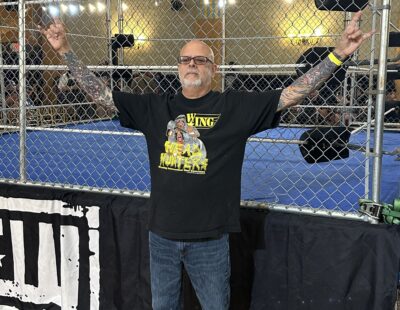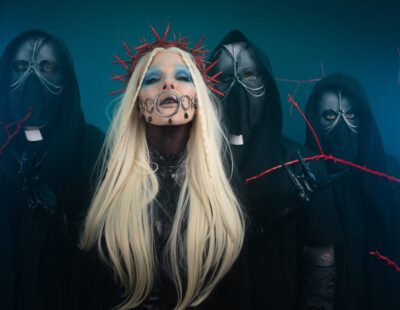
Thundering out of Kansas City with triumphal double-headed vocals, searing prog-sludge riffs and rampaging, locked-in rhythms, Hyborian’s time is now. The trio’s debut, simply titled Volume I, was snapped up by Season of Mist in 2018 after being originally released by The Company in 2017, introducing the band to a larger worldwide audience. The second instalment in a trilogy, Volume II (out 20 March through Season of Mist), from Martin Bush (vocals, guitars, synths), Ryan Bates (guitars, bass, vocals) and Justin Ripetto (drums) showcases even sharper arrangements, and the music travels with untamable force and sets a worthy foundations for an array of dovetailing vocals refrains, which are more intricately layered, varied in tone and memorable than before.
Every aspect of an already-exciting sound—including an overarching fantasy-based concept in keeping with Robert E. Howard lore—has been honed as tightly as possible across a very concise 40-minute trail. “There wasn’t really a thought process behind it,” says Bush when asked whether it was a main goal to condense their sound to its most vital basis, “we just kept doing what we do, and improved as writers and musicians over those two years.” Bates concurs: “Yeah, we are really just making the music we want to make, and are really lucky that other people seem to be liking it.”
Decibel caught up with the band ahead of the album’s release to discuss their close friendship as a fuel for chemistry, their collective goals, their tight songwriting restrictions, the time in the studio and the looming Mastodon comparisons that will be lazily applied when the greater world hears how Hyborian have managed to achieve the difficult-to-master balance of writing complex music within the confines of pretty traditional structures.
Decibel: How would you say you guys have developed as musicians and people in the time between Volume I and Volume II?
Bates: We are older, grumpier, and have better chops.
Bush: Older and grumpier for sure.
Ripetto: Volume II is definitely more technical, so we really had to up our playing. There has been lots of growth for all of us as musicians in that time period.
What kind of impact has signing to Season of Mist had for the band?
Bush: It has definitely shown us to a wider audience; they’ve been great to work with.
Bates: Knowing that we aren’t just out on the road on our own, and that if something awful happens there is a support network, has been awesome—and access to distribution has been awesome.
Ripetto: Yeah, we are super excited to see what they do with this album.
You sweated it out building your own studio a couple of years ago but subsequently moved out. Can you tell us what happened?
Bush: The neighborhood we had it in has [become] very expensive over the last two years as Kansas City has grown, and we just got priced out by rent increases. We landed in a great spot that we share with a bunch of our friends, though, and it’s great.
How big a deal is your friendship outside the band when it comes to creating the chemistry necessary to write Hyborian material?
Bates: Huge. Like any relationship it takes a lot of work, but yeah, it’s huge.
Bush: We honestly bounce so much off each other—there is no way any of us could write this stuff on our own. The three-way dynamic is the cornerstone of everything we do. We are brothers, and sometimes we fight like brothers, but most of the time we are a solid unit. By far the most important relationships in my life.
You told us previously that the main goal of the band is to push yourselves. In what ways have you done so for Volume II?
Bush: The vocal interplay with the guitars on Volume II is way more intense, so learning to play the guitar parts and sing the vocals at the same time was a long, hard row to hoe.
Bates: The degree of difficulty on the vocals was definitely a huge step up from Volume I: rhythms are more technical; notes are higher.
Bush: Yeah, we wrote most of the vocals in-studio, so when we came out and started woodshedding the material we kind of went “oh god, what have we done to ourselves,” but it just took some patience and hard work, and it all came together great for the live show.
You set some strict guidelines when it came to the song-writing. Namely that you all had to agree on the riff or it went in the trash. Did this cause any major disagreements during the creative process?
Ripetto: Sometimes a riff isn’t something everyone loves, but the way we bounce ideas off each other it ends up morphing into something we all like. That part of our process is pretty seamless.
Bush: Yeah, it may take us a little longer to write material than a band that has a primary songwriter, but I really feel like the music is better for it. Three heads are definitely better than one in this case.
Was it cool to record in a big-budget, state-of-the-art studio for the first time with producer Josh Barber (Norma Jean) at the helm?
Bush: It was awesome—best experience of my life. Josh was amazing to work with, and Gene Abramov, the owner [of B24 Studios], is a super-old buddy. Martin and Justin actually used to play in a rock ‘n’ roll band with Gene. Definitely go record at B24 Studios if you ever get the opportunity.
Ripetto: It was just seamless—Josh is a wizard. We just had a great time. At one point, Josh took pictures of my new Q Drums kit and posted it to craigslist for $5, with the title “STUPID IDIOT DRUM KIT,” which was hilarious, and then realized he had basically pranked himself because his phone didn’t stop ringing all day with responses from Craigslist trolls. We were in there for a month, so there was a lot of hard work, but it was really just great times with our buddies.
For non-fantasy literature readers, can you tell us about the overarching concept that runs across your discography to date?
Bush: The original plan was to do three records: the first dealing with stories from pre-history, the second dealing with the end of time, and the third focusing on the modern industrial age. The central figure is an interstellar, multi-dimensional being called The Traveller. Even though the second record deals with the end of time, it is basically an origin story for that character.
What about the original novel written for the conceptual base, featuring the main character The Traveller? Was it easy to write? Will it be released in book form with a version of the LP?
Bush: It definitely did not come easy; it took me about 14 months to write it, and I was working pretty much every free moment I had. The book is actually out—you can get it through our Big Cartel page right now, and there is a special edition package deal that Season of Mist will have that comes with the book and the LP.
Lazy journalists will focus heavily on how much you guys recall Mastodon. To me, this comparison is a compliment despite its limiting nature as a description given the scope of influences heard in your music if you listen closely. Do you take it as a compliment or is it starting to become a bit of a drag?
Ripetto: They’re an amazing band and definitely part of our influence, so for sure it’s a compliment.
Bates: Yeah, it isn’t everything in our sound, but being compared to any band we love is awesome.
Bush: We love Mastodon, and while I definitely feel like we have some other influences we wear more openly on our sleeves—it’s really tough to know what other people are going to hear in the music you make. I’m all for it; if someone is noticing us enough to compare us to something, that’s gotta be a good thing.
What is about bands like Mastodon or Baroness—or any band within that prog-sludge metal sphere—that drew you in? Is it the open-endedness of the style, which allows for melody and riff-might to collide in various ways without reverting to tired formulas?
Bush: For sure. While I love a lot of metal that adheres to strict genre rules, there is a huge amount of appeal for me with bands that transcend genre limitations.
Ripetto: Not having genre rules is awesome!
“We’re a rock ‘n’ roll band that also listens to King Crimson and weird conceptual bands.” That band quote really sums up the intricate musicianship on display but also the concise run-time of the album. Did you consciously have to keep the rock ‘n’ roll mentality in place to rein in the experimental aspects or was it pretty effortless?
Bates: It’s a more natural and effortless thing for sure. Hyborian is really just us pouring ourselves out onto tape.
Bush: The three of us listen to a lot of the same stuff, but each of us listen to stuff the others wouldn’t. That combination of influences and experiences is really what creates that.
What are your hopes for the new album once it’s out?
Bush: Just to keep plugging away, doing what we are doing. Keep the dream alive!
Bates: Yup.
Ripetto: Anything that keeps it going, and lets us keep doing this. Hopefully some bigger tours; just to keep growing is really it.







